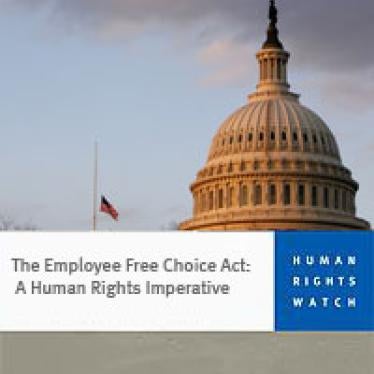(New York) - Many European companies that publicly embrace workers' rights under global labor standards nevertheless undermine workers' rights in their US operations, Human Rights Watch said in a report issued today.
The 128-page report, "A Strange Case: Violations of Workers' Freedom of Association in the United States by European Multinational Corporations," details ways in which some European multinational firms have carried out aggressive campaigns to keep workers in the United States from organizing and bargaining, violating international standards and, often, US labor laws.
Companies cited include Germany-based Deutsche Telekom's T-Mobile USA and Deutsche Post's DHL, UK-based Tesco's Fresh & Easy Neighborhood Markets and G4S Wackenhut security, France-based Sodexo food services and Saint-Gobain industrial equipment, Norway-based Kongsberg Automotive, and the Dutch firm Gamma Holding.
"The behavior of these companies casts serious doubt on the value of voluntary commitments to human rights," said Arvind Ganesan, director of the Business and Human Rights Program at Human Rights Watch. "Companies need to be held accountable, to their own stated commitments and to strong legal standards."
Among the violations documented in the report are practices of forcing workers into "captive audience" meetings to hear anti-union harangues while prohibiting pro-union voices, threatening dire consequences if workers form unions, threatening to permanently replace workers who exercise the right to strike, spying on employee organizers, and even firing workers who support organizing efforts at companies.
The Human Rights Watch report is based on thirty interviews with workers and employees' testimony in legal proceedings, findings and decisions of US labor law authorities, company documents, and written exchanges with company management.
"The US needs to close the loopholes in the country's woefully inadequate laws to protect workers, including reforms embodied in the Employee Free Choice Act," Ganesan said. "The US labor law system is characterized by long delays, weak penalties, and one-sided employer access to staff inside the workplace."
The report also recommends stronger oversight by European headquarters of US managers' practices; stronger standards-setting and complaint mechanisms by international organizations such as the International Labor Organization (ILO) and the Organization for Economic Cooperation and Development (OECD); and stronger action by European governments and the European Union to require adherence to international standards by European firms.
In researching the actions of European companies, Human Rights Watch found:
- T-Mobile had characterized employees' "talking about rights" as dangerous activity to be reported immediately to management;
- DHL management threatened and discriminated against workers who tried to organize;
- Tesco management sought to muzzle workers' communication among themselves about unions;
- Sodexo threatened, interrogated, and fired workers who tried to form a union;
- The Dutch Gamma Holding company hired permanent replacements, in contravention of international standards but not of US law, to take the jobs of workers who exercised the right to strike.
The report noted that all the companies cited endorse some combination of the core labor standards of the ILO, the industrial relations guidelines of the OECD, freedom of association norms of the Universal Declaration of Human Rights and the United Nations Global Compact and other international human rights instruments.
"Even self-proclaimed ‘progressive' companies can and do take full advantage of weak US laws to stifle freedom of association," Ganesan said. "Unless the US strengthens and enforces labor standards, it's hard to see how workers in the US will exercise their rights."







